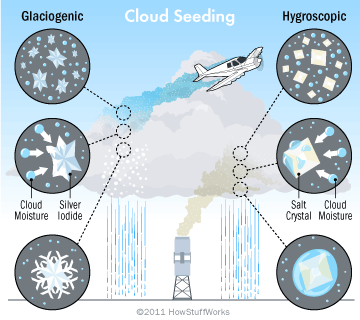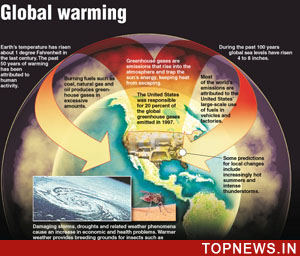Noted climate scientist Ken Caldeira of the Carnegie Institute for Science at Stanford has finally popped the question. In an article entitled “One Known Way to Cool the Earth” on the February 16, 2015 USA Today opinion page, Caldeira writes: “There is basically only one way known to cool the Earth rapidly.” He explains the method “”is to reflect more …
No longer a conspiracy: Company now offering cloud seeding services to control the weather
It’s no longer a conspiracy theory. The most wealthy and powerful can control regional weather patterns using cloud seeding technology. The sky has literally become a sandbox, a playground, and the world’s elite have access to technology allowing them to use the weather to their advantage. The controversial practice of cloud seeding to control weather is indeed moving out of …
What I Know When I Eat Locally
The other day, I was cleaning out my freezer and something magical happened. Not only did I get a nice, organized freezer, but I realized what it really means to eat locally. When you eat locally, you know things about your food that people who shop at the grocery store do not. On the labels of nearly every package of …
Epoch-defining study pinpoints when humans came to dominate planet Earth
The human-dominated geological epoch known as the Anthropocene probably began around the year 1610, with an unusual drop in atmospheric carbon dioxide and the irreversible exchange of species between the New and Old Worlds, according to new research published in Nature. Previous epochs began and ended due to factors including meteorite strikes, sustained volcanic eruptions and the shifting of the …
Exploration – 03.13.15
Lester Brown on the state of the world.
California is pumping water that fell to Earth 20,000 years ago
By now, the impacts of California’s unchecked groundwater pumping are well-known: the dropping water levels, dried-up wells and slowly sinking farmland in parts of the Central Valley. But another consequence gets less attention, one measured not by acre-feet or gallons-per-minute but the long march of time. As California farms and cities drill deeper for groundwater in an era of drought …
‘Epic Fail’: Feminism and Ecological Crises
We humans are an epic fail. In internet-speak, that term can be used derisively or sympathetically. A failure of grand proportions can be labeled “epic” either to mock or to offer condolences to someone who fails so completely. However, given the speed at which pop-culture fads come and go, I’m told by younger informants that the term is already long …
Applauding Themselves to Death: Why the UN climate talks have wasted 23 years
If you visit the website of the UN body that oversees the world’s climate negotiations(1), you will find dozens of pictures, taken across 20 years, of people clapping. These photos should be of interest to anthropologists and psychologists. For they show hundreds of intelligent, educated, well-paid and elegantly-dressed people wasting their lives. The celebratory nature of the images testifies to …
Evolving to cope with climate change
Over the next two centuries, climate change is likely to impact everything from industrial agriculture to the shape of our coastlines. The changing climate will certainly cause huge changes around the world, and the challenge is to predict exactly what impact those changes will have. In the world of marine science, this means grappling with a process called ocean acidification. …
Our Planet’s Lungs Are Dying
Trees are like our planet’s lungs. Every second of every day, they’re absorbing CO2 from the atmosphere, and converting it into energy. In fact, according to a study by researchers at NASA, each year, tropical rainforests absorb a staggering 1.4 billion metric tons of CO2 from Earth’s atmosphere. Through the process of photosynthesis, they’re “inhaling” that CO2, and keeping it …









